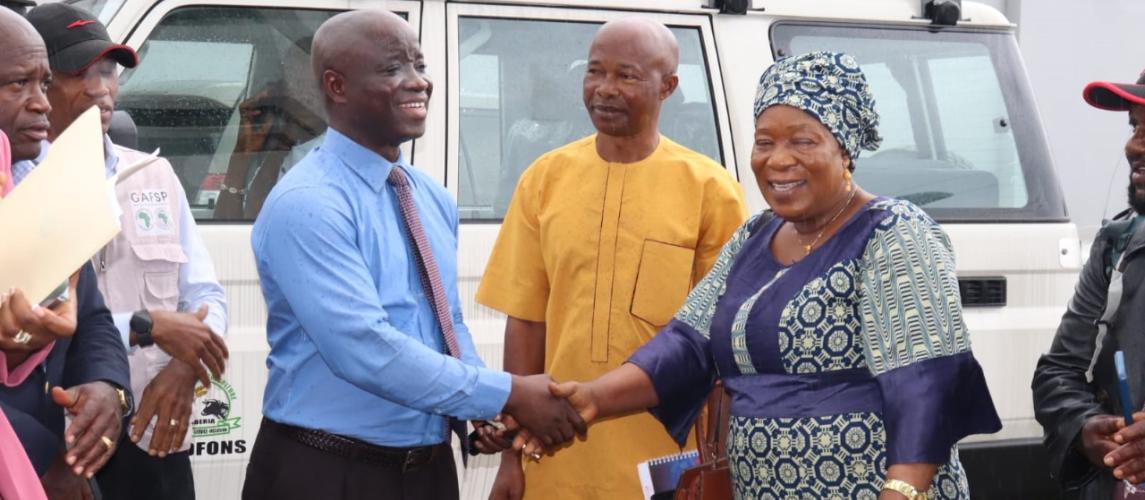
AfDB Supports Liberia’s Agricultural Sector with Logistics for SADFONS/CARI Project and Seed Development Certification Agency
CONGO TOWN, Monrovia – In a major boost to Liberia’s agriculture sector, the Ministry of Agriculture, with support from the African Development Bank (AfDB) through the SADFONS Project (Smallholder Agricultural Development for Food and Nutrition Security), has provided critical logistical support to the Central Agricultural Research Institute (CARI) and the Seed Development Certification Agency (SDCA).
The donation includes two vehicles, a Toyota Land Cruiser SUV and a pickup truck, along with nine Yamaha AG 100CC motorcycles to strengthen field operations, research, and seed certification efforts across the country.
Speaking during the official handover ceremony in Monrovia on July 17, 2025, Minister of Agriculture J. Alexander Nuetah emphasized the vital role of research and certified seed production in achieving food self-sufficiency and agricultural sustainability in Liberia.
“There is no way Liberia can succeed in agriculture without a strong research backbone. To grow, we must provide logistical support to those who are working tirelessly to support our farmers,” said Minister Nuetah. “Today, we are turning over vehicles and motorcycles to two critical institutions, CARI and SDCA, who are at the center of our efforts to improve seed quality, productivity, and resilience in agriculture.”
The Minister praised CARI’s resilience and commitment to progress, despite limited funding and support in recent years. “CARI has continued to make strides. With this additional logistical support, we believe the institution will be empowered to do even more,” he added.
On reducing seed imports and promoting local certification, Minister Nuetah also highlighted the strategic importance of the Seed Development Certification Agency (SDCA) in ensuring the production and distribution of high-quality seeds.
“For too long, Liberia has depended on the importation of weak and unviable seeds. That’s about to change. With the work SDCA is doing, we are on track to begin certifying local seed producers this year. By next year, we hope to stop the importation of uncertified seeds into the country completely,” he said.
The Ministry of Agriculture has committed to recognizing only certified seed growers and vendors, ensuring that farmers receive seeds that are viable, high-performing, and suited to Liberia’s agroecological conditions.
“We are calling on vendors and buyers alike to purchase seeds only from certified growers. The Ministry will not accept or purchase seeds from uncertified sources going forward,” the Minister stressed.
Representing CARI, Mrs. Abibatu T. Kromah, Administrator, expressed gratitude to the Ministry of Agriculture, the World Bank, and other partners for the timely intervention.
“This support means a lot to us. Given where CARI has come from, this gesture is a strong encouragement. Our target for this year is to produce 100 metric tonnes of seed rice. With these new vehicles and motorcycles, we are confident in our ability to reach that target,” she said.
Mr. Jobson A. Momo, Director General of the SDCA, echoed similar appreciation and reaffirmed his agency’s commitment to ensuring that seeds distributed across Liberia meet strict quality standards.
“Our work is critical to developing a reliable national seed system. We will use this support to expand our collaboration with farmer cooperatives and develop them into certified seed companies,” Momo stated. “This is a major step toward reducing reliance on saved seeds from previous harvests and promoting awareness of diverse, high-performing seed varieties with strong market potential.”
Despite growing momentum, Liberia’s seed sector continues to face several challenges, including dependence on reused seeds from previous harvests, which often result in poor crop yields. Limited awareness among farmers about the availability and benefits of certified seed varieties also persists. Furthermore, inadequate infrastructure hinders seed testing, certification, and distribution.
The SADFONS Project, through this additional financing and targeted support from the Bank, seeks to address these gaps and help position Liberia for a more food-secure and resilient future.
